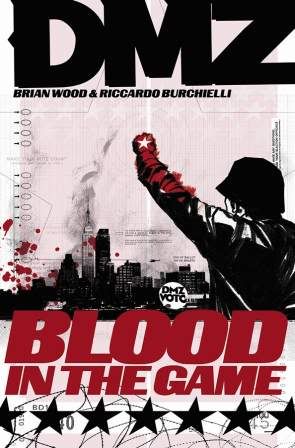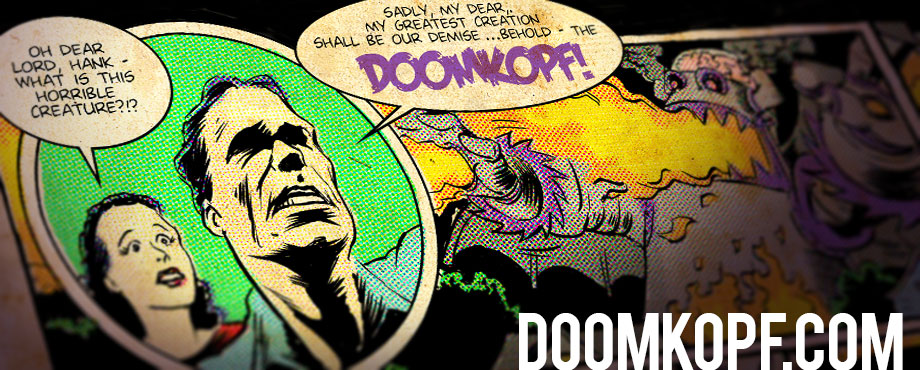After Watchmen: DMZ
 So you’ve seen the Watchmen movie, and maybe you liked it, and maybe you’ve read the graphic novel, and you surely liked that. But where do we go from here? DC is certainly on the ball with their “After Watchmen” recommendations, offering up a plethora of choices to suit your fancy. Whether you liked the superheroes, the mature take on the genre, the doomsday scenario, or the political atmosphere, there are a lot of books out there to keep up the pace.
So you’ve seen the Watchmen movie, and maybe you liked it, and maybe you’ve read the graphic novel, and you surely liked that. But where do we go from here? DC is certainly on the ball with their “After Watchmen” recommendations, offering up a plethora of choices to suit your fancy. Whether you liked the superheroes, the mature take on the genre, the doomsday scenario, or the political atmosphere, there are a lot of books out there to keep up the pace.
This week I’m going to recommend DMZ, by Brian Wood and Ricardo Burchielli, which is already part of DC’s master plan, anyway. DMZ is a mature comic with intelligent commentary, clever writing, and a rock solid world. That last part is the keystone that holds everything else together.
World-building is important in stories, and one could argue that both Marvel’s and DC’s success in the 1960s hinged on the fact that their characters lived in the same world; that the characters live in a reality that feels as real as the one you’re living in now, but it was different and intruiging. (At the very least, both companies have assuredly taken advantage of the intertwining story potential in the last few years.)
All of my favorite movies and books have built up engrossing worlds around the characters and stories. Inherently, this background noise rarely comes to your attention, but when you think back, you realize that they often play a three-dimensional character without a face. Some of the most developed worlds I’ve seen are in Star Wars and Akira. Even “real” worlds like Minnesota and North Dakota in Fargo, or Japan in Lost in Translation can sweep you up in their freshly shot landscapes.
So DMZ has this world, and it’s set in a modern-day alternate reality wherein the United States has had a second Civil War, and it has torn the country asunder. When all the fighting died down, (though the conflict never really stops) NYC was declared a demilitarized zone. Here, tensions run high and trust low, but somehow society manages to remain relatively civil despite the anarchy. It’s a lot like the world in Jubilee—I’m sure few have seen this 1977 flick, but if you have, you’ll appreciate this, because that world was one of the few saving graces in that film.
It also helps that DMZ spans some largely unspecified chunk of time. It allows the world to evolve, and the characters with it, without having to have one significant event seemingly change a character’s attitude overnight. Sometimes a month will pass between story arcs, and sometimes it’s a year. Wood does a good job manipulating the important players in his stories, but having an expanded timeline allows him to set them up just right, without having to bore us with the details. He trusts his readers to be smart enough to understand the culmination of certain events without having to explain them outright.
This is where the maturity to the title comes in. I’ve touched on why I love comics for adults before with Criminal, and DMZ is another great example of comics-as-literature. Here, Wood is able to just do what he wants. To write, and push, and promote his ideals, his cynicism, his calls to action. He isn’t struck down by the moralizers, censors, and editors. Everything is just out there, and it sucks you in. Artist Burchielli capitalizes on his own granted freedom as well. From disturbing scenery to scandalous encounters, the artist does not hesitate to render or embellish.
So, relating this all to Watchmen is the main goal of this piece, and so now I’m going to draw the lines.
Most obviously, both Watchmen and DMZ are quite political. In fact, both books deal with alternate-universe scenarios based around a slightly askew political landscape. While Watchmen is more of a doomsday story, DMZ is flavored a bit more like a post-apocalypse. If one can make such a comparison, DMZ is better in this regard because it’s more relevant. Sure, Watchmen has a lot to say that still holds weight today, but Wood is writing his story now, and it very directly correlates to current world events. The most recent trade paperback even echoes the themes of hope and change of the last presidential race.
In addition to the political commentary, Moore, too, packed in a lot of social commentary. The small number of issues required Watchmen’s author to skillfully cram a ton of nuance into twelve issues, but this density also aided the book in its march towards its devastating conclusion. Whereas Moore was tight and labored, Wood gives a little breathing room to the characters of his world, devoting whole books to people other than his protagonist. Wood obviously has a lot to say about our current state of affairs, and really it’s been building for a long time before he started his work on this series. Breaking off from the main story to highlight the surroundings and the personal accounts of essentially unrelated characters is a way to discuss society at large, and to go beyond only war.
Finally, if you like the punk rock values of Alan Moore, you’re going to love Wood’s more apparent attitude. Doominator already touched on Moore’s anti-establishmentarianism in a previous post, which is something I previously never overtly attached to his name, but reading that article brought out some solid connections. Wood has a lengthy back-catalog of counter-culture writings such as the nihilistic The Couriers and the decidedly emo Demo. In a way, it feels like Wood has dialed down the fuck-all attitude with DMZ, but really I think it’s just the writer coming to grips with his impending maturity (see also Local). It’s still a crazy, anarchic world in his NYC, but Wood has brought out a kind of order underneath it all.
Watchmen is, of course, thick with other ideas that are not shared with DMZ, but they’re both solid stories with interesting ideals. If you’re interested in the politics, social commentary, or counter-culture of Watchmen, but want it applied to our modern world, be sure to grab this great set of books. DMZ is roughly halfway through a planned run of 60 or 70 issues, and is currently collected into six trade paperbacks.
